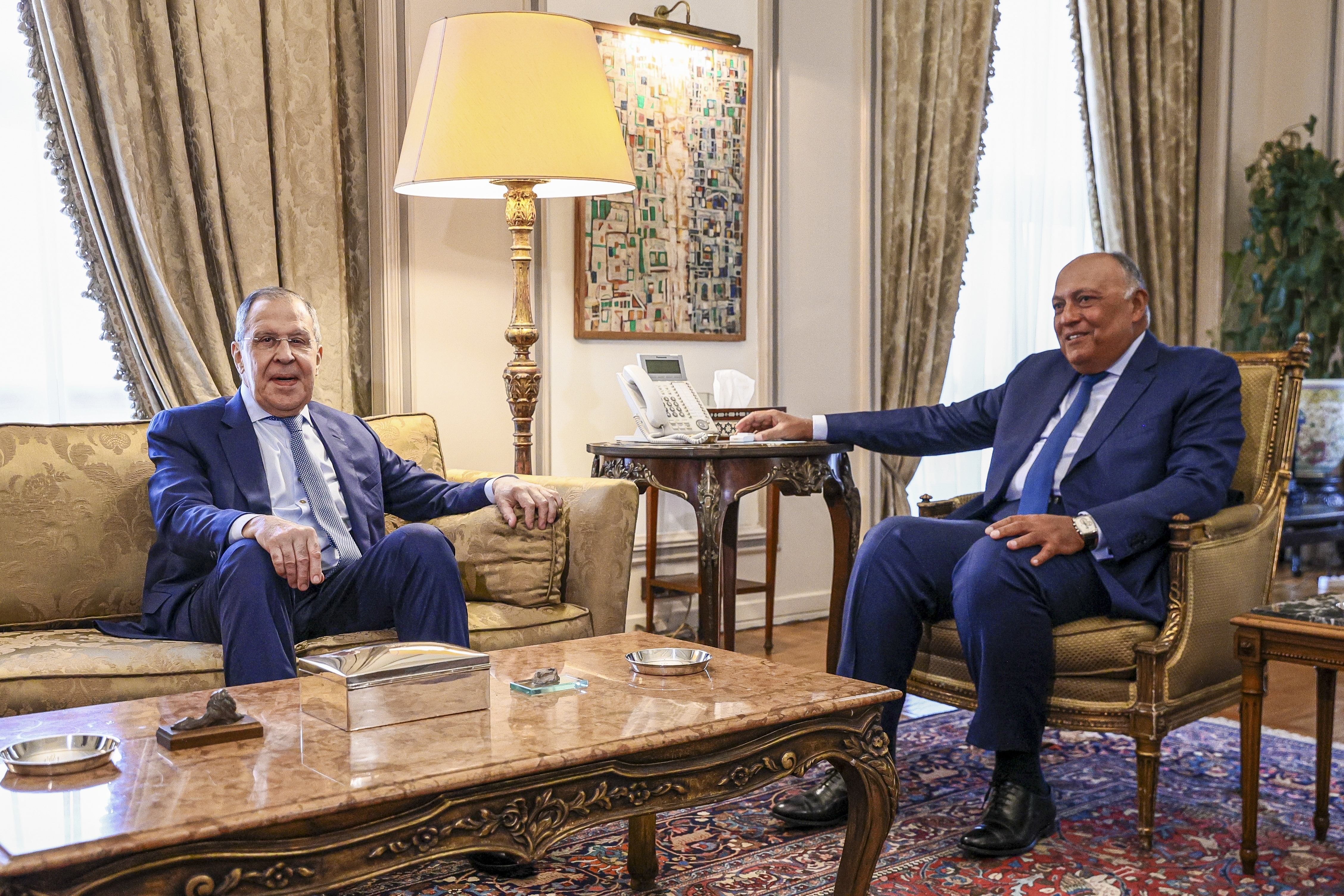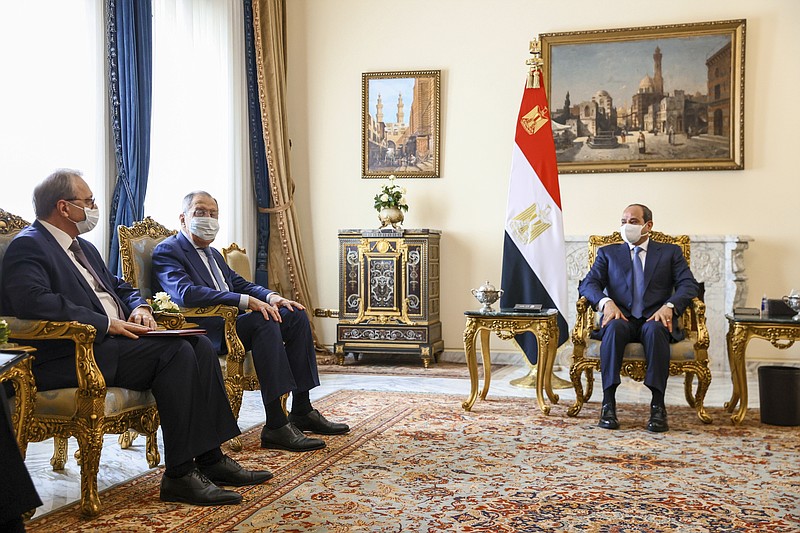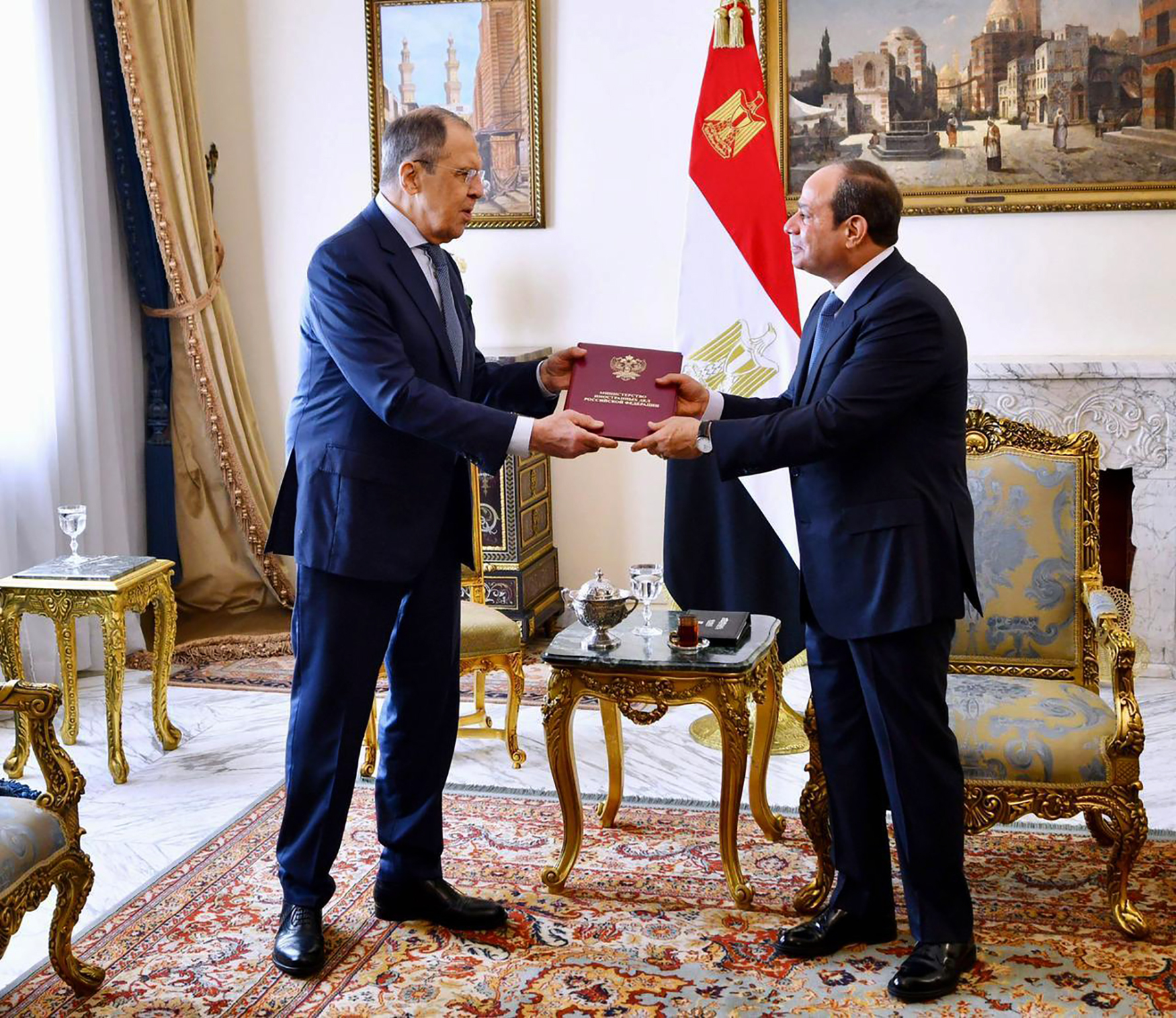CAIRO -- Russia's top diplomat was in Cairo for talks Sunday with Egyptian officials as his country seeks to break the diplomatic isolation and sanctions by the West over its invasion of Ukraine.
Sergey Lavrov landed in Cairo late Saturday for the first leg of his Africa trip, which will also include stops in Ethiopia, Uganda and the Democratic Republic of Congo, according to Russia's state-run RT television network.
On Sunday, he first held talks with President Abdel Fattah el-Sissi, then his Egyptian counterpart, Sameh Shukry. Lavrov also met with Arab League Secretary-General Ahmed Aboul Gheit, before addressing the pan-Arab organization, the Arab League said.
In a joint news conference with Shukry, Lavrov said he discussed Russia's "military operation" in Ukraine with Egyptian officials who urged "a political and diplomatic" settlement to the conflict.
Lavrov laid the blame on Ukraine for the rupture of earlier peace talks.
"We do not have any prejudices about resuming negotiations on a wider range of issues, but the matter does not depend on us," he said. "Ukrainian authorities, from the president to his innumerable advisers, constantly say that there will be no negotiations until Ukraine defeats Russia on the battlefield."
The Russian diplomat used his speech at the Arab League to press the Kremlin's narrative that the West pushed his country to invade Ukraine and accused the West of ignoring Russia's security concerns stemming from NATO's expansion eastward.
After Russia's airstrike Saturday on the port of Odesa, Ukraine, it was not immediately clear how plans to resume shipping Ukrainian grain by sea in safe corridors out of Ukrainian Black Sea ports would be affected.
Lavrov said in Cairo that Russian grain exporters are committed to fulfilling their obligations in the wake of twin U.N.-backed deals signed by Moscow and Kyiv to unblock the grain shipments from Ukrainian ports.
"We discussed the specific parameters of cooperation in this area, agreed on further contacts between the relevant ministries and we have a common understanding of the causes of the grain crisis," he said, without elaborating.
Russia's war in Ukraine has had dire effects on the world economy, driving up oil and gas prices to unprecedented levels. Ukraine is one of the world's largest exporters of wheat, corn and sunflower oil, but Russia's invasion and naval blockade of its ports have halted shipments.
Some Ukrainian grain is transported through Europe by rail, road and river, but with higher transportation costs. The war has also disrupted shipments of Russian products because shipping and insurance companies are reluctant to deal with Western sanctions on Russia.
African countries are among those most affected by ripples of the war. The prices of vital commodities skyrocketed and billions of dollars in aid have been directed to help those who fled the war in Europe. That has left millions of people in conflict areas in Africa and the Middle East suffering from worsening shortages in food and other assistance.
In an article posted on the Russian Foreign Ministry website, Lavrov rejected the West's accusations that Russia is responsible for the global food crisis as "another attempt to shift the blame to others."
Seeking to rally African nations on his country's side, he hailed what he called "an independent path" they took in refraining from joining the West in sanctioning Russia and the "undisguised attempts of the U.S. and their European satellites to gain the upper hand, and to impose a unipolar world order to the international community."
The article was also published in four African newspapers.
At the Cairo news conference, Lavrov also said a second Russia-Africa summit will be held in mid-2023 as part of Moscow's efforts to expand Russia's clout in this part of the world. The first summit was held in 2019 at the Black Sea resort of Sochi.
Lavrov's visit comes less than two weeks after President Joe Biden's Mideast trip. Biden visited Israel and also the occupied West Bank before heading to Saudi Arabia. He also attended a regional summit of Gulf Arab countries and also Egypt, Jordan and Iraq in Saudi Arabia.
Egypt, the Arab world's most populous country, has refused to take sides on Russia's war in Ukraine as it maintains close ties with Moscow and the West. Egypt is also among the world's largest importers of wheat, mainly from Russia and Ukraine.
El-Sissi completed a three-day visit to Serbia last week, the first in more than 30 years by an Egyptian president. Serbia has also abstained from joining Western sanctions against Russia and has maintained friendly relations with Moscow despite the war. The Egyptian leader also visited Germany and France last week.
Russia and Egypt have strengthened their ties considerably in recent years as el-Sissi and Russian President Vladimir Putin developed a close personal rapport, which helped increase military and economic cooperation.
Also last week, Russia's state-owned atomic energy corporation, Rosatom, began construction of a four-reactor power plant in Egypt.
ODESA PORT AIRSTRIKE
Russian defense officials insisted Sunday that an airstrike on the Ukrainian port of Odesa hit only military targets, but the attack tested an agreement on resuming grain shipments that the two countries signed less than a day before the assault.
Long-range missiles destroyed a docked Ukrainian warship and a warehouse holding Harpoon anti-ship missiles supplied by the U.S., Defense Ministry spokesman Igor Konashenkov said at a daily briefing.
Speaking late Saturday in his nightly televised address, Ukrainian President Volodymyr Zelenskyy said the attack on Odesa "destroyed the very possibility" of dialogue with Russia.
Under the grain-shipment agreement obtained by The Associated Press, Kyiv and Moscow agreed not to target vessels and port facilities involved in the initiative, including the ports of Odesa, Chernomorsk and Yuzhny.
The Ukrainian military said the attack involved four cruise missiles, two of which were shot down by Ukrainian air defenses.
Command spokeswoman Nataliya Humenyuk said no grain-storage facilities were hit. Turkey's defense minister, however, said he had had reports from Ukrainian authorities that one missile struck a grain silo while another landed nearby, although neither affected loading at Odesa's docks.
It was not immediately clear how the airstrike would affect plans to resume shipping Ukrainian grain by sea in safe corridors out of the ports.
Russia and Ukraine on Friday signed identical agreements with the United Nations and Turkey in Istanbul aimed at clearing the way for the shipment of millions of tons of desperately needed Ukrainian grain, as well as the export of Russian grain and fertilizer.
Senior U.N. officials voiced hopes that the deal would end a monthslong standoff that threatened food security around the globe.
Elsewhere Sunday, Ukrainian authorities reported that Russian shelling continued to kill and wound civilians in Ukraine's south and east.
The governor of the eastern Donetsk region, one of two that make up Ukraine's industrial heartland of the Donbas and a key focus of Russia's offensive, said two civilians had been killed and two more wounded over the previous 24 hours.
The U.K. military reported Sunday in its daily intelligence update that Russia was making "minimal progress" in its Donbas offensive, which it said remained small-scale and focused on the city of Bakhmut in the eastern Donetsk region.
The Ukrainian military's General Staff confirmed in its regular update that Russia was "conducting military operations to create conditions" for an assault on Bakhmut, while firing on surrounding settlements and battling Ukrainian defenders for control of a nearby thermal plant.
In Ukraine's south, regional officials said at least five civilians were wounded by Russian shells in the Black Sea port of Mykolaiv on Saturday night and Sunday morning.
"Also, as a result of the scattering of munitions and their fragments, fires occurred in open areas in the city," said Vitaly Kim, governor of the Mykolaiv region.
Information for this article was contributed by Susie Blann of The Associated Press.
 In this handout photo released by Russian Foreign Ministry Press Service, Russian Foreign Minister Sergey Lavrov, left, and Egyptian Minister of Foreign Affairs Sameh Shoukry pose for a photo prior to their talks in Cairo, Egypt, Sunday, July 24, 2022. (Russian Foreign Ministry Press Service via AP)
In this handout photo released by Russian Foreign Ministry Press Service, Russian Foreign Minister Sergey Lavrov, left, and Egyptian Minister of Foreign Affairs Sameh Shoukry pose for a photo prior to their talks in Cairo, Egypt, Sunday, July 24, 2022. (Russian Foreign Ministry Press Service via AP)
